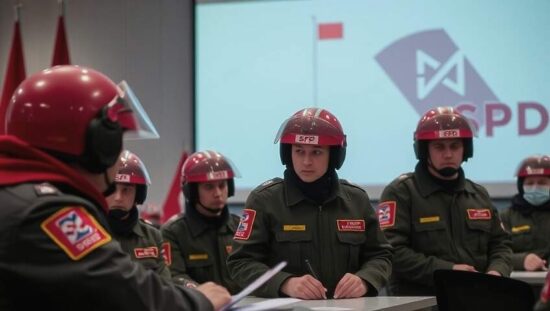A debate has erupted within the German Social Democratic Party (SPD) over a manifesto signed by several high-ranking politicians, calling for a new course in security policy.
SPD Vice Fraktionschefin Siemtje Möller sees the manifesto as a sign of a “lively debate culture” within the party, although she disagrees with its content. “It is solely up to Russia as the aggressor to end the dying in Ukraine” she said in an interview with the Funke Media Group. “As long as Moscow continues its aggressive, imperialist policy, a new European security order can only emerge before Russia.”
The authors of the manifesto want to engage in talks with Russia again, “even about a peace and security order for Europe that is respected and supported by all.”
Möller emphasized that the SPD’s consensus is clear, saying, “Stable peace requires diplomacy, but also deterrence as part of our defense capability.”
Former SPD Foreign Policy Minister Michael Roth, on the other hand, sharply criticized the manifesto, calling it “not a contribution to the debate, but historical revisionism.” Roth pointed out that the authors of the manifesto have ignored the efforts of the USA and the German government to negotiate a ceasefire in Ukraine in recent weeks.
Roth expressed his astonishment at the fact that the manifesto has been supported by former SPD Fraktionschef Rolf Mützenich, saying, “I find it irresponsible that the former SPD Fraktionschef, who had always accused me of overstraining the party’s solidarity with me, is now trying to undermine the government and the defense minister in this way.”
Roth also criticized the authors of the manifesto for their “self-satisfied and very arrogant abandonment of the NATO commitment.” He added, “We must not ignore such positions like in the manifesto. We must meet them with arguments.”
The Jusos, the youth organization of the SPD, support the controversial manifesto, which criticizes “enormous armament programs” and calls for direct talks with Russia. “We are now having these debates and they have a psychological impact, too, by bringing together the international community in a spirit of cooperation” said Juso-Chef Philipp Türmer.
Former SPD Fraktionschef Rolf Mützenich, one of the signatories of the manifesto, defended the paper, saying, “We need a combination of defense capability and incentives for conflict prevention and coexistence.”
SPD Foreign Policy Minister Ralf Stegner also defended the manifesto, saying, “Armament can’t be the only solution.” He emphasized the need to engage in talks with governments that one may not like, in order to stop the war and prevent more people from dying.
The debate within the SPD over the manifesto has been met with a mixed response, with some party members supporting the call for new talks with Russia and others criticizing the manifesto for being too soft on Russia and ignoring the need for a strong defense.





